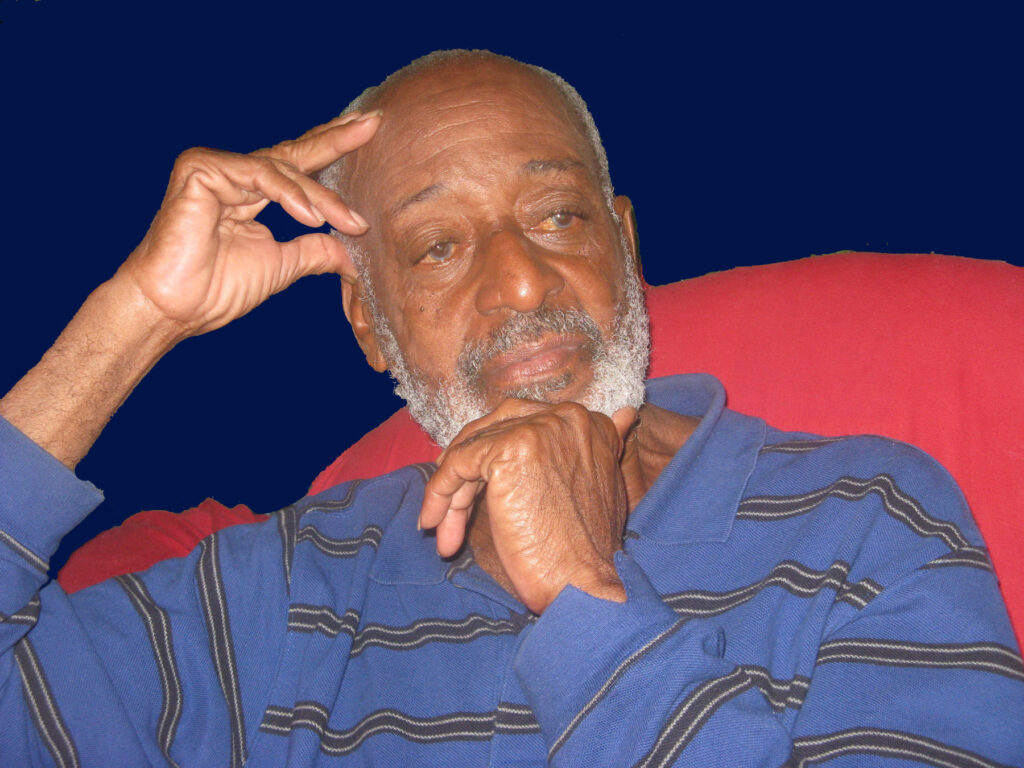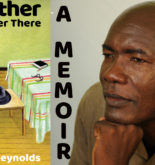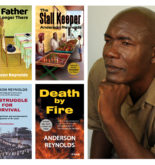by Dr. Travis Weekes
Allan Weekes is Saint Lucia’s oldest living theatre director and most accomplished Kwéyòl translator. He is the only Saint Lucian to have translated and directed classical plays into Kwéyòl. He used his combined skills as an educator, director and language expert to train actors to deliver the poetic drama of classical theatre into Kwéyòl. This was a lonely and laborious effort. However, as the cliché goes, hard work does pay off (even though not always literally), but Weekes would eventually capture the attention and gain the respect of cultural leaders both in and out of Saint Lucia. Weekes gave serious attention to the work of Derek Walcott decades before Walcott was awarded the Nobel Prize for Literature. He demonstrated Walcott’s creole poetics and theatrical power in Kwéyòl adaptations of four of his plays, namely: The Sea at Dauphin, Malcochon, Ti Jean And His Brothers, and Ione.

Weekes was born in Castries on August 17, 1934, where he grew up in a large family comprising nine boys and two girls. His father was a cook and his mother a housewife. They were both staunch Roman Catholics and raised their offspring in the teachings of that faith. Allan attended the Saint Aloysius Primary School and then later Saint Mary’s College where he took a keen interest in French, Literature and Latin. Allan’s parents, Cyril and Elmira Weekes (nee Jn. Pierre) were both born in Vieux Fort and Elmira was an avid speaker of Kwéyòl. Allan spent his school holidays with his maternal grandmother in the Vieux Fort town.
It was at Saint Mary’s College that Weekes would meet the great Derek Walcott, future poet, playwright and Nobel Laureate in Literature and co-founder of the Saint Lucia Arts Guild. The young Walcott was a new master at Saint Mary’s and Weekes remembers the exciting lessons in Greek Mythology. After graduating from Saint Mary’s College, Weekes taught at various primary schools throughout the island such as his alma mata, the Saint Aloysius Primary, as well as at Odsan Primary, Grace Primary and La Croix Primary Schools, where he also served as principal.
Weekes’ teaching career ran parallel with his development as a theatre practitioner. In the early 1950s, Weekes developed a close working relationship with Derek’s twin brother, Roderick (Roddy), also a playwright, when he became a member of the Saint Lucia Arts Guild. Weekes had submitted a copy of his play. “Talk of the Devil” to Roddy. The play was subsequently presented by the Arts Guild at the Castries Town Hall and then in Roseau, Dominica, during a tour of the island. Weekes became a leading member of the Arts Guild, organizing its first National Theatre Festival along with deceased actor, Irvine Gray. Weekes functioned as a director of the Guild until 1971 when he departed the island to read English and French at the University of the West Indies (UWI, Cave Hill Campus, in Barbados. “Talk of the Devil”, would later be published by UNESCO.
Upon graduating from UWI, Weekes would make a significant contribution to tertiary education. He was hired as a Lecturer to introduce French at the Saint Lucia Teacher College. However, it is in the area of theatre, that Weekes would continue to make his mark. His interest in the development of Kwéyòl has always been as strong as his interest in theatre and for this reason they cohered in his artistic pursuits. Using the writing system developed by Canadian linguist, Bricault, Weekes completed his first translation of a play, “The Rose Slip” by Douglas Archibald, into Kwéyòl. This would precede the Folk Research Centre’s project of developing a writing system for the language. Consequently, Weekes was drafted unto the team by the cultural organization to work under the guidance of linguists Professsor Lawerence Carington and Jean Bernabe for the production of a Kwéyòl orthography. Weekes would subsequently co-author with Dominican Marcel D’Jamala Fontaine, one of the earliest instructional texts on Saint Lucian Kweyol, entitled, Kweyol: A Basic Guide.
As a tutor at the Saint Lucia Teachers’ College, Weekes introduced drama as an elective and with the help of fellow tutor Alix Rose Gilliard, started the Creole Theatre Workshop. Weekes proceeded to translate many Caribbean plays into Kwéyòl. His Kwéyòl adaptations of Derek Walcott’s “The Sea At Dauphin” and Malcochon would impact the sensibilities of the cultural fraternities of Saint Lucia, Martinique and Guadeloupe. Weekes and the Creole Theatre Workshop began travelling to the French islands of Martinique and Guadeloupe with productions in Kwéyòl. The warm reception he received encouraged him to produce many other Kwéyòl adaptations of Caribbean plays. He was also called upon to direct national productions for Saint Lucia’s representation overseas, most notably, Derek Walcott’s “Dream on Monkey Mountain” for Carifesta 1981, and Roderick Walcott’s “The Banjo Man” for Caribbean Focus in London, in 1987.
In 1986, Weekes’s son Travis enrolled as a student at the Saint Lucia Teacher’s College and into his father’s drama class. He took an immediate interest in his father’s project to develop a Creole Theatre. Some of the earliest actors who benefited from Weekes’ expertise are Mathias Burt, Theodolous Erysthee, Brenda Calixte, Moses Jn Baptiste and Michael Gaspard. The Creole Theatre Workshop staged many productions around the island. In 1993, when the Government of Saint Lucia organized a national event to celebrate Walcott’s winning of the Nobel Prize for Literature, the Creole Theatre Workshop was invited to perform alongside The Trinidad Theatre Workshop at the National Cultural Centre. Weekes staged his Kwéyòl version of Malcochon, much to the appreciation of the honoree himself, Walcott, whose enthusiasm drove him backstage to congratulate director, cast and crew.
Weekes’ work in Creole Theatre gained the attention of significant agencies and cultural figures in the society. Dame Pearlette Louisy, then Governor General and Chairperson of the Nobel Laureate Committee, would give support to the productions to celebrate Nobel Laureate Week. Weekes would also train Kennedy Samuel, actor and former director of the Folk Research Centre to render Walcott in Kwéyòl.
Significantly, Weekes collaborated with Alliance Francaise and the Folk Research Centre to bring actors from Martinique and French Guyana, to stage classics such as “Salome” by Oscar Wilde, “Antigone” by Sophocles and Ti Jean and His Brothers by Derek Walcott, all in Kweyol. This work held particular significance for Weekes. He had always dreamt of bilingual productions: in English and Kweyol. In the case of Wilde’s “Salome”, not only did he direct the play in French but he produced an adaptation that inter-texted both the Kweyol and the French, in characterization and phrasing. In effect, the productions with Alliance Francaise were unique because Weekes’ actors worked in three languages: French, Kwéyòl and English.
Although long retired from full-time teaching, Allan Weekes continues to remain active as a critic, editor and Kwéyol translator. Indeed, he functions as mentor to many writers on the island, including McDonald Dixon, Natalie Payne, Modeste Downes and Anderson Reynolds.
Allan Weekes is one of Saint Lucia’s cultural heroes.
![]()



